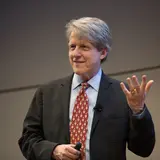
The Historian’s Notebook: When Burton Malkiel, Author of a Finance Classic, Led Yale SOM
Best known for his book A Random Walk Down Wall Street, which introduced many readers to passive investing, Malkiel was also a Yale SOM dean who helped build the school’s faculty and curriculum.
The Historian’s Notebook: 50 Years of Business & Society is a blog series created in preparation for the 50th anniversary of Yale SOM in September 2026. The series is written by Yale SOM’s resident historian, Michelle Spinelli. Reach out if you have an idea for a blog post, memories or photos to share, or an inquiry about SOM history.
Did you know that Burton G. Malkiel was once dean of the Yale School of Organization and Management? While most people associate his name with Princeton University and the investment classic A Random Walk Down Wall Street, Malkiel served as dean of Yale SOM from 1981 to 1987, making a lasting impact on the school.
After receiving his B.A. degree from Harvard College in 1953 and an MBA from Harvard Business School in 1955, Malkiel served as a finance officer for the U.S. Army, where he introduced a computerized payment and accounting system that was eventually used at bases around the globe. He then worked in investment banking at Smith Barney.
Malkiel switched gears in the early 1960s, earning his PhD in economics from Princeton in 1964. This launched an illustrious career in academia, first at Princeton and then at SOM. As chair of the economics department at Princeton, Malkiel introduced a finance curriculum for the first time. He also served on the Council of Economic Advisors under President Gerald Ford and as a consultant to the Federal Reserve System.
In 1973, Malkiel published the book that would make him famous in the field of investment management, A Random Walk Down Wall Street: The Best Investment Guide that Money Can Buy. “More than any other book,” Bob Pisani of CNBC noted, the text “popularized the idea of indexing as an investment strategy and why you can’t beat the market.”
A Random Walk Down Wall Street argues that passively managed index funds should be at the core of investors’ portfolios. “A blindfolded monkey throwing darts at the stock listings could select a portfolio that would do just as well as one selected by the experts,” Malkiel wrote. Seen as revolutionary at the time of publication, Malkiel’s ideas are now widely accepted.
Last year, A Random Walk Down Wall Street celebrated its 50th anniversary with an updated 13th edition. According to Daniel Akst of the Wall Street Journal, the book—despite its many years of updates—has retained “the author’s trademark blend of erudition and wit.”


At SOM, where he was appointed dean in 1981, Malkiel recruited Yale College economist Sharon Oster, who would serve as dean of the school from 2008 to 2011, as well as four future Nobel laureates: Oliver Williamson, Bengt Holmström, Robert Shiller, and Paul Milgrom.
According to Oster, who died in 2022, Malkiel’s recruits “helped raise the visibility of the school in the eyes of academics.” He had “an instinct for high-quality faculty who would be relevant in a management school, and I would say he was excellent at the complicated business of managing those faculty,” she said.
During Malkiel’s tenure at SOM, enrollment in master’s degree programs surged by 50% to 182 students. He introduced new courses like Law and Operations, Small Business and Entrepreneurship, and Oral and Written Communications. And he launched the Public Service Loan Assistance Program, a first among the nation’s business schools, offering debt relief to students taking jobs in the nonprofit sector.
For his distinguished service at SOM, his alma mater, Harvard Business School, presented Malkiel with an alumni achievement award in 1984. “We salute and support you in your efforts to build an outstanding institution to prepare leaders for public as well as private management,” John H. McArthur, then dean of Harvard Business School, said during the award presentation.
Malkiel resigned his post as dean of SOM in 1987 and headed back to Princeton, where he is now Chemical Bank Chairman’s Professor of Economics, Emeritus. He has served on many corporate and nonprofit boards over the course of his career, including at Vanguard, which introduced the first index mutual fund, where he was on the board for 28 years.



